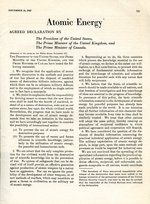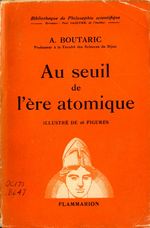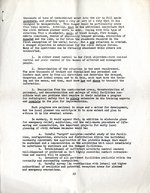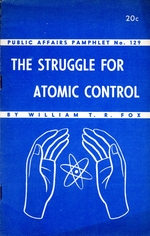The atomic bomb changed the world. In an instant, it made the United States into a superpower unlike any seen before, redefined total war, and altered the course of human history. When the initial shock of this tremendous new weapon wore off, the international community was able to appreciate just how different politics and war were in the atomic era. Nations around the world found themselves asking the same question: How can we control this weapon?
On November 15, 1945, the leaders of the United States, Great Britain, and Canada met to sign the Agreed Declaration, the first international agreement on nuclear policy in world history.1 After much deliberation, the three nations committed to the peaceful application of nuclear technology and declared that there would be no dissemination of technical information regarding the construction or functioning of nuclear armaments.
Despite clarifications made in the Agreed Declaration, the question of control remained unanswered. At the outset, the United States supported an international governing body to oversee atomic policy.2 The United Nations, which had been ratified by the U.S. two days after the attack on Hiroshima and officially formed on October 24, 1945, seemed the optimal candidate.
Three months after its founding, the United Nations General Assembly created the U.N. Atomic Energy Commission.3 The organization was asked to recommend a course of action to control nuclear development and prevent atomic war. The U.N. hoped that the committee’s findings would lead to an international agreement to reduce or neutralize the threat of nuclear conflict. In turn, the U.N. Atomic Energy Commission requested proposals from the United States and other nations.
As the U.N. assembled its Atomic Energy Commission, the U.S. began to develop its own organization for atomic affairs. On August 1, 1946, the Atomic Energy Act was passed by Congress.4 The bill, expanding on the policies in the Agreed Declaration, required that atomic energy be given over to civilian control, military research on atomic energy be kept secret from all other nations, and that a blanket classification be placed over all atomic energy data. The bill likewise created the U.S. Atomic Energy Commission to oversee matters in atomic energy.
Notes
- 0473. "Atomic Energy: Agreed Declaration by the President of the United States, the Prime Minister of the United Kingdom, and the Prime Minister of Canada." The Department of State Bulletin, Vol. XIII, No. 334. pp. 777-820. Washington, D.C.: U.S. Dept. of State, November 18, 1945. Return to text ↑
- 0542. Taylor, Hon. Glen H. Creation of a World Republic. Speech in the Senate of the United States Wednesday, October 24, 1945. Washington, D.C.: Congressional Record, 1945. Return to text ↑
- 0545. United Nations Atomic Energy Commission. First Report. . . to the Security Council December 31, 1946. Washington, D.C.: USGPO, 1947. Return to text ↑
- 0543. Thomas, Morgan. Atomic Energy and Congress. Ann Arbor: U. of Michigan Press, 1956. HD9698.U5 T5. Return to text ↑




